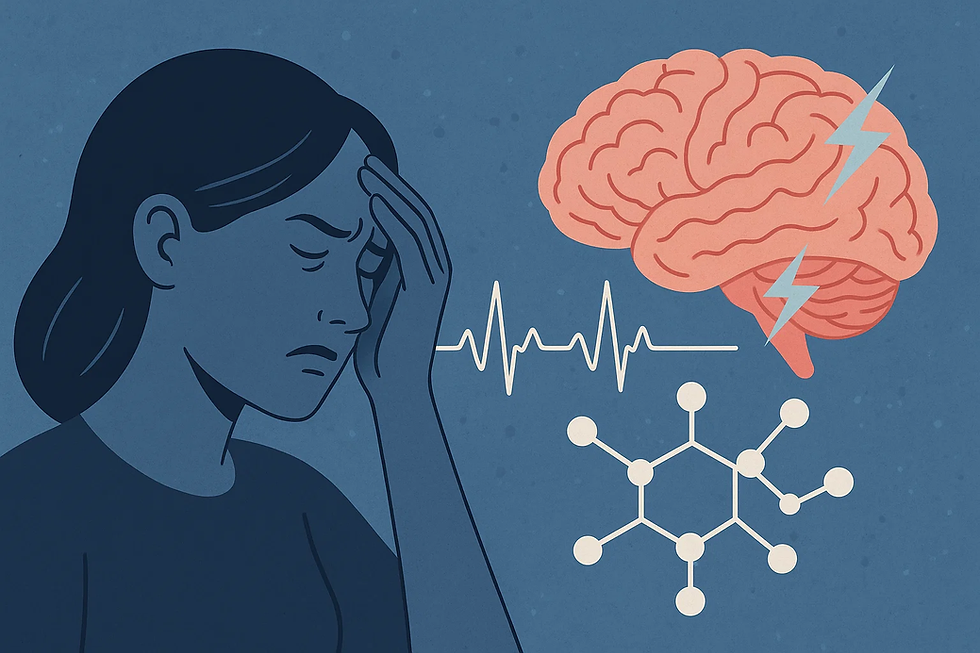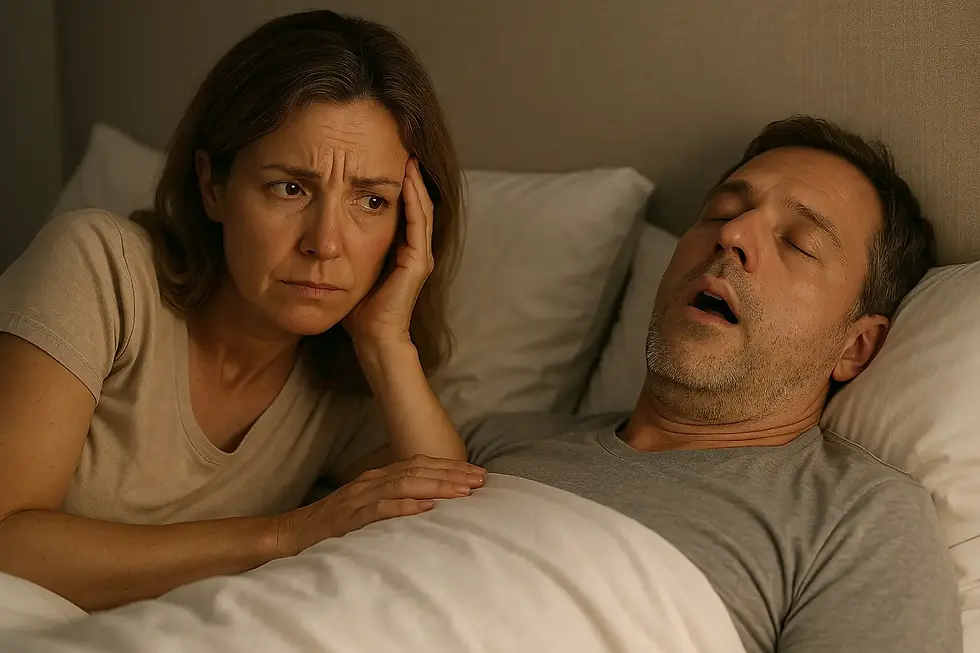Understanding Anxiety and Panic Attacks: The Science Behind Anxiety
- av5883863
- Aug 2
- 6 min read

What is Anxiety?
Anxiety is a natural emotional response to stress, marked by feelings of worry, fear, or uneasiness about the future, past events, or uncertain outcomes. Occasional anxiety is normal, but it can become a challenge when it becomes excessive or persistent enough to interfere with daily functioning. It can manifest physically as symptoms such as a rapid heartbeat, restlessness, or trouble sleeping, and may require professional help if it is excessive or persistent.
Physical Symptoms of Anxiety
When someone has anxiety, what are the symptoms?
The heart rate, the heartbeat, increases. We call this palpitations. The heart starts beating very fast, and the beating is so fast that many times the patient feels that the heart will come out or they will have a heart attack.
Another symptom is sweating. The patient starts sweating a lot. Whenever he feels a little anxious, he starts sweating, and when he sweats, he feels that other people are noticing that he is sweating, and his anxiety increases further.
The third symptom is tremors, which can occur in the hands or throughout the body. We call it tremors in English.
Apart from this, symptoms include cold hands and feet, an upset stomach, and frequent urination. All these are also called symptoms of anxiety.
Now, see, we easily recognize the physical symptoms of anxiety, but there are some psychological symptoms of anxiety too, there are mental symptoms too. The most common mental symptom of anxiety is excessive worry. Worrying about everything without reason. Worrying about every small thing. Suppose you are sitting at home and call your brother, but he doesn't pick up.
You'll immediately start getting anxious thoughts that something has gone wrong. Has there been an accident? Has there been some mishap? Or suppose you have an exam after three months. You have studied well. Still, you start worrying that I will fail the exam. What if I am not able to reach the exam centre on the day of the exam? So in this way, worrying about every small thing or things that have not been done is what we call excessive worry.
So if these physical symptoms and these mental symptoms or psychological symptoms are found in someone, then it is called anxiety, and it is often a part of some anxiety disorder. So if you or someone you know, or a family member, is having these symptoms, then these are symptoms of anxiety. Meet your nearest psychiatrist for anxiety and get the treatment you need.
What Causes? - Science Behind Anxiety
Most people have felt anxious at some point in their lives. Sweating starts, the heart beats faster, breathing becomes short, you feel chest pain, nausea, stomach ache, muscle tension, and dizziness. To understand what anxiety is, we must first look at the physiology behind this condition.
Once we know this and become aware of all that is lying underneath this process, we can handle anxiety and trick our mind to reduce this feeling of overwhelm. Not completely remove it, but reduce its effects.
To begin, we need to inspect the human brain further. Inside, there is a section called the limbic system. It is a set of brain structures located underneath the cortex. The limbic system plays a vital role in regulating emotions, behaviour, memory, and motivation. In particular, it handles fear, which is crucial for our survival.
The central part of this system is a structure called the amygdala. Besides its function in cognitive processes and memory, the amygdala is shown to play a significant role in alerting our brain to danger. We can think of it as the "brain's alarm".
This way, the amygdala sends signals to the hypothalamus, subsequently activating the "fight or flight" response and the production of stress hormones.
Sometimes, there is no actual threat—it is just our anticipation of it. However, our body doesn’t like to take risks, so the alarm system activates. This is anxiety—the fear of what may happen.
Panic Attack?
So what exactly is a panic attack? See, a panic attack is an extreme form of anxiety or panic in which the symptoms of anxiety or panic are severe.
During a panic attack, the patient becomes extremely anxious. He is experiencing a lot of physical symptoms, such as the heart is beating very fast, chest pain, breathing problems, tremors in the hands, body tremors, and sweating.
Some people feel that they will fall. Many people feel that they are having a heart attack, and some people get so nervous that they feel that they will simply go crazy.
When this panic attack happens, the person does not understand what is happening to them. He either reaches the emergency himself or someone known to him, a family member takes him to the emergency, and usually all the tests are done in the emergency.
Specifically, your heart tests, ECG, and blood tests have been completed, and the results indicate that the heart condition is fine. Physically, your patient is excellent. Another thing to remember is that the age of a panic attack patient is also usually around twenty or thirty. There are young patients in whom heart symptoms are rarely found anyway.
From Panic Attack to Panic Disorder
Now, how does a patient travel from panic attack to panic disorder? So first, let me tell you what panic disorder is. Panic disorder means repeated panic attacks.
So this is our patient, who has already had a panic attack. Now he has a fear in his mind that maybe he has some heart disease, and he is afraid that he might have an attack again.
So he starts avoiding many things. As is often the case, patients start avoiding climbing stairs, running, or exercising. Some people start avoiding going out alone. They start avoiding driving because they have a fear in their mind that if they do this, they might get an attack again, or if they get an attack, who will save them?
Now see, this is where the problem starts. You have a fear in your mind that something might happen. So what happens? Even if you usually have palpitations and your heartbeat is slightly increased, your mind immediately notices the increase. Something might happen. When this thought comes to your mind, your anxiety increases further. Now, when anxiety increases, the heartbeat increases further, the anxiety increases further, and as it increases, the attack happens again.
Why Do Panic Attacks or Panic Disorders Happen?
Now the question arises, why do we get panic disorder or panic attacks? Now we have seen that this disease starts in different patients due to different reasons.
In some people, a family member or an acquaintance has a significant disease, after which the patient gets a little scared about their health, and from there, panic disorder starts.
For example, suppose someone in your patient's family has a heart attack, and on hearing this, your patient starts feeling scared, and due to fear, he also feels a little pain in the chest, and from there, the panic attack starts.
Other patients have some medical problems, and from there, fear sets in their minds.
And many patients suddenly get panic attacks without any reason.
Conclusions:
Anxiety and panic attacks are not simply passing feelings. They are tied to the brain scaffolds concerned with survival, such as the amygdala and the fight-or-flight system. Acute anxiety is, to some extent, typical and common; however, the complex of symptoms, including physiologic and psychologic manifestations, can lead to the crippling of everyday functioning, culminating in the development of panic disorder.
The more one understands the ‘anatomy’ of anxiety, the less mysterious and, in a way, more empowering these experiences become, enabling patients to seek timely and not much-needed professional help. If such signs are recognized, the timely intervention of a mental health professional can provide a correct evaluation, proper reassurance, and treatment.
FAQs
1. What is the difference between an anxiety attack and a panic attack?
Anxiety is defined as a worry or fear that is persistent and constant, and a panic attack is a bout of fear that is sudden and intense and is accompanied by extreme physical tension.
2. Do the symptoms of anxiety only include mental symptoms?
Not at all, anxiety symptoms manifest both mentally and physically in the form of a rapid heartbeat, sweating, shaking, gastrointestinal problems, and shortness of breath.
3. What has the potential to trigger a panic attack?
Panic attacks can be triggered by stress, trauma, health concerns, or sometimes even occur for no apparent reason.
4. Is there any possibility that an anxiety or panic attack could mimic a heart attack?
Absolutely. Often, panic attacks are triggered by factors such as intense fear, with symptoms such as chest pain and rapid heartbeat, making medical evaluation necessary.
5. What is the proper treatment for anxiety and panic disorder?
They can be managed effectively through therapy, lifestyle changes, and in some cases, medication prescribed by a mental health practitioner.




Comments